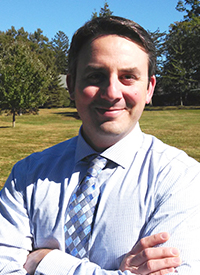A new program called Supervisory Leaders in Aging promises to help several chapters of the National Association of Social Workers dramatically improve the delivery of healthcare and social services to older adults.
 Daniel Kaplan, Ph.D.’s innovative program remedies leadership deficiencies in gerontological social work
Daniel Kaplan, Ph.D.’s innovative program remedies leadership deficiencies in gerontological social work
Launched in January of 2015 with a $1 million grant from the John A. Hartford Foundation, a new program called Supervisory Leaders in Aging promises to help several chapters of the National Association of Social Workers (NASW) dramatically improve the delivery of healthcare and social services to older adults. The three-year study was inspired, in part, by the work of Daniel B. Kaplan, Ph.D., assistant professor in Adelphi’s School of Social Work and a co-investigator on the grant.
“My passion is for clinical social work,” said Dr. Kaplan, who served as national director of social services for the Alzheimer’s Foundation of America before joining the faculty of the School of Social Work in 2015. “My research involves both intervention and implementation studies aimed at optimizing care services, clinical interventions and supportive environments for older adults with mental and neurological disorders who are living in the community. Supervisory Leaders in Aging offers professional development and training to enhance skills and expertise among social work supervisors in different settings so they can support their social service teams in meeting the needs of older adults and their families.”
At the Alzheimer’s Foundation, Dr. Kaplan trained and supervised a team of social work clinicians, designed and managed service programs and worked closely with program innovators from around the United States. This experience built upon his previous work in an Elder Protective Services and Elder at Risk program, where he conducted forensic investigations and extensive interventions on behalf of the state of Massachusetts.
“While I was directing the counseling program at the Alzheimer’s Foundation, I became increasingly aware that many older people with dementia and their families were not getting the care they required,” Dr. Kaplan said. “This was because many providers lacked the necessary skills and knowledge.”
Supervisory Leaders in Aging aims to address that problem. The program stems from a collaboration between Dr. Kaplan and Barbara Silverstone, Ph.D., a social work pioneer and one of the leading figures in the field of services for people with disabilities. Dr. Kaplan met Dr. Silverstone while he was completing his doctorate at Columbia University School of Social Work, and the two joined forces on several pilot projects in New York between 2009 and 2016. Those projects became the genesis of Supervisory Leaders in Aging.
 A series of gerontological social work supervision professional development workshops created by Dr. Kaplan and Dr. Silverstone have been underway for the past year and a half at NASW chapters in New York, Maryland, Illinois and Florida, where Supervisory Leaders in Aging recruited master’s-level social workers who supervise staff serving older adults. “Our participants complete a 10-module, 30-hour face-to- face training program that covers both gerontological social work and leadership skills, and builds local peer mentoring networks among the participants in each cohort,” explained Dr. Kaplan. With just two rounds of training in the four states, the project prepared 135 supervisors to guide the work of 1,200-plus providers who serve more than 260,000 clients annually.
A series of gerontological social work supervision professional development workshops created by Dr. Kaplan and Dr. Silverstone have been underway for the past year and a half at NASW chapters in New York, Maryland, Illinois and Florida, where Supervisory Leaders in Aging recruited master’s-level social workers who supervise staff serving older adults. “Our participants complete a 10-module, 30-hour face-to- face training program that covers both gerontological social work and leadership skills, and builds local peer mentoring networks among the participants in each cohort,” explained Dr. Kaplan. With just two rounds of training in the four states, the project prepared 135 supervisors to guide the work of 1,200-plus providers who serve more than 260,000 clients annually.
In nearly every respect, the pilot has been a resounding success, Dr. Kaplan reported. “As we conducted the project we were exploring a number of important questions,” he said. “Is the model acceptable to stakeholders? Can NASW chapters adopt and deliver the program in their unique local communities? Do participants who were selected into the program more frequently use the best practices being taught in the workshops?”
More than 90 percent of participants found the program schedule enabled them to participate conveniently while holding jobs, and the program received a 96 percent approval rating from its graduates. The workshop curricula were constructed around best practices derived from field research, which Dr. Kaplan tested participants on before the program began. After they completed the program, he tested them again and found that participants made significant gains putting those best practices to use at work.
Early next year, the NASW will invite all 55 of its chapters nationwide to adopt the program. Given the success of the four-state pilot, Dr. Kaplan is highly optimistic that a large number of the chapters will sign on and create innovative partnerships to bring the program into new communities, signaling a bright future for high-quality gerontological care.
Daniel Kaplan, Ph.D., works to create professional development and training projects to enable clinicians to better meet the needs of older adults and their families. His research includes both intervention and implementation studies to optimize care services, clinical interventions and supportive environments for older adults with mental and neurological disorders. Having joined the School of Social Work faculty in 2015, he has already introduced a new course for social work graduate students about providing the best care and service for the growing and vulnerable population of dementia sufferers.For further information, please contact:
Todd Wilson
Strategic Communications Director
p – 516.237.8634
e – twilson@adelphi.edu